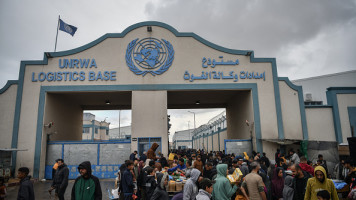Declassified documents reveal torture, hunger at Israeli-run prison in south Lebanon
Newly declassified documents from Israel's Shin Bet internal security service have revealed shocking details of torture, hunger, and denial of medical care that detainees were exposed to in the Khiam Prison in south Lebanon.
The prison, which was built in 1985, was run by Israel and its proxy militia the South Lebanon Army until it closed in 2000 after Israel's occupation of southern Lebanon ended.
The documents were declassified after Israeli human rights activists petitioned the country's high court and detailed in a report by the Israeli newspaper Haaretz.
"The torture inflicted in Khiam Prison is a crime against humanity," Itay Mack, an Israeli lawyer representing the activists told Haaretz. "The documents that were revealed due to the petition are shocking, and constitute only a miniscule glimpse into the hell that they ran there."
One of the declassified documents admitted that prisoners were held there indefinitely without charge or trial or even an administrative detention order issued.
"No confessions are taken from those interrogated at this facility, they are not prosecuted, there is no detention order against them and the period of their detention depends on the severity of their deeds, without any determination of the length of their prison stay," it read.
Another document said that a woman had "received electricity in her fingers" - i.e. was tortured with electricity - after she was suspected of association with Hezbollah, the Iran-backed Lebanese group which expelled Israel from south Lebanon in 2000 after a prolonged guerrilla war.
A 1988 document said that prisoners had gone on hunger strike due to a shortage of food, stating that it was only supplied to 240 prisoners out of the 260 being held there at the time.
A document from 1997 reveals that prisoners whose "health was in danger" were not being treated, noting that a doctor only visits the prison once a week or "by specific invitation".
Amnesty International previously stated that 11 detainees died in the prison over the 15 years it was operational.
Around 300 prisoners were present at the facility at any one time according to Haaretz.
Some came from various Lebanese and Palestinian groups opposed to Israel's presence in Lebanon such as Amal, Hezbollah, the Popular Front for the Liberation of Palestine (PFLP), and the Communist Party, but others were of "unclear" affiliation.
The documents also show that Shin Bet was actively involved in interrogations at the prison, which was technically run by the notorious South Lebanon Army militia.
![The Khiam prison in south Lebanon was abandoned by Israel in 2000 [Getty]](/sites/default/files/styles/large_16_9/public/2022-03/GettyImages-946126776.jpg?h=69f2b9d0&itok=mqKHiOCt)


